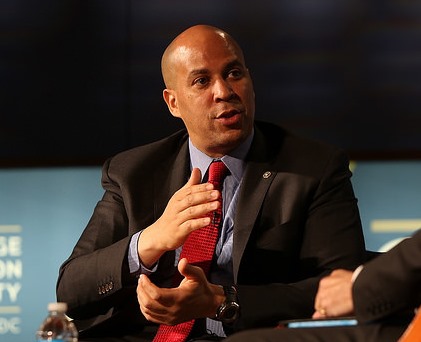
Cory Booker served as Major of Newark, N.J., from 2006 to 2013. We originally published this piece in October 2013, during his race to become the junior U.S. Senator from New Jersey. It highlights how his deft embrace of social media has played an important role in his success. Follow him on Twitter @CoryBooker to gain insight into his strategy.
Though Booker has utilized a variety of social media platforms, his active and engaging presence on Twitter has been particularly exceptional. In 2010, for instance, he used tweets to communicate directly with Newark residents during a major snowstorm—a move that in turn drew national media attention. “Not only do Newark residents know that Booker is clearing the driveways of people with Twitter handles, so does much of the national political twitterati, which is blogging about him,” the Washington Post’s Krissah Thompson observed at the time.
Recognizing opportunity
“We all need to be who we are and be ourselves but not being in social media is almost like Nixon not wanting to put make up on for a TV appearance,” Booker told Reuters’ Paul Smalera during an interview in June. The mayor also recounts to Smalera how his first foray into Twitter was inspired by a chat with Ashton Kutcher:
“I remember I was travelling back to my law school and driving up highway 95 talking to him. He spent must have been 45 minutes on the phone, really challenging me and explaining to me the benefits of taking control of your own media, of connecting with thousands of people. He said, “Look, I want you to do it but I don’t just want you to do it. I want you to dive in head first and be authentic on the platform, take risks.’
Booker’s social media skills have earned him the title of “Hometown Hero” in “TechCrunch’s 20 Most Innovative People In Democracy 2012,” which observed that his “million-strong Twitter feed spouts everything from dense nuggets of inspiration to real-time problem-solving with his constituents.”
Earlier this year at SXSW Interactive, Booker spoke about how he has “used Twitter to interact with his constituents on a daily basis, responding to questions and complaints at all hours of the day,” as well as how, with the help of Twitter, his “constituency is technically only 280,000 people, but it’s also the United States.”
Even someone as tech-savvy as Booker is prone to the occasional social media misstep, as his brief, past correspondence on Twitter with an Oregon stripper has shown. But Booker’s response to the incident was characteristically cool and collected. “The mayor talks with people from all walks of life on Twitter,” Booker spokesman Kevin Griffis said in a statement. “The most shocking part of the story was learning that there is a vegan strip club in Portland.”
A potent tool
If he wins the special election next week, Booker, who even announced his run for Senate via Twitter and YouTube, “would arrive at the senate armed with a social media army that includes 1.4 million Twitter followers and a drive to shake up the system,” according to NBC News’ Kasie Hunt. The exact impact Booker would have in Washington isn’t easy to predict, but if his campaign is any indication, social media will be a central part of his strategy. On the day of his primary win back in August, Booker “posted prolifically to his various accounts — more than 100 times on Twitter, 12 on Facebook and three on Instagram, including one video,” according to Mashable‘s Fran Berkman.



